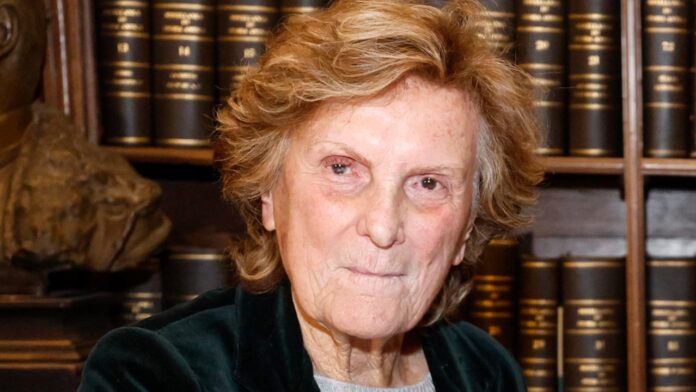Today, Liliana Cavani receives the Golden Lion for Lifetime Achievement from the Venice Film Festival, where she presents out of competition The Order of Time, inspired by the book by physicist Carlo Rovelli.
A nonconformist artist, free from ideological preconceptions, perennially modern, moved by the urgency of a continuous search for truth and a political, anti-dogmatic gaze, courageous in confronting even the most challenging taboos. These are some of the reasons why Venice 80 awarded Liliana Cavani one of this year’s two Golden Lions for Lifetime Achievement (the other goes to Hong Kong actor Tony Leung). The director, 90 years old last Jan. 12, is also presenting out of competition on the Lido her latest film, L’ordine del tempo, inspired by the book of the same name by physicist Carlo Rovelli, written with Paolo Costella, starring Alessandro Gassmann, Claudia Gerini, Edoardo Leo, Ksenia Rappoport, Valentina Cervi, Francesco Rongione, Francesca Inaudi, and Angela Molina, and produced by Indiana, Vision, which distributes it in theatres from Aug. 31, and Gapbusters with Rai Cinema. It is the story of a group of friends in a seaside villa coming to terms with the world’s end.
How did your passion for Rovelli’s book come about?
The Order of Time stimulated a thought in me, and it is not the only book by Carlo that I like. I have a degree in ancient literature, but I have a certain melancholy for scientific subjects, curiosities, and an interest. That’s why in 1968 I made Galileo and in 2008 Einstein, a TV miniseries that was more awarded in London than in Italy.
Time haunts us.
We have it on us; it is part of our lives, but fortunately, we have a balance that allows us to joust quite a bit on the issue.
What is your relationship with time?
I don’t think about it much; I only do it if I get the melancholy of a lost person. You become aware of time when you almost touch a changing reality, which is constantly changing, so time is worthy of reflection.
Do you still have fun on the set?
Very much so. If I have good actors, even more so. And in the film, I had outstanding actors, very involved, fair, and believable. Because cinema, more than theatre, lives on this credibility. I got along very well; the production gave me the performers I wanted, whom I had seen and appreciated in the cinema.
How do you get from Rovelli’s book to a narrative film?
A lot can be told with cinema. The images have great strength; it is no coincidence that the letters came into being almost as an invoice of a real object. The screenplay work was enjoyable: one reflects, discusses with a freedom immersed in possibilities and then arrives at a synthesis.
How would you react to the news of a possible, imminent end of the world?
I imagined many things; everyone would have a different reaction. We come face to face with life, while usually, we follow a daily routine and do not stop to reflect on our existence. But it is a race against time, and we know that he always wins. The history of time is fascinating; it took a lot of it to come to a standard, global time to establish epochs and have wristwatches. Time is now part of the common language, but the time of our lives requires more thought.
Today, time seems to go faster and faster partly because of our lifestyle.
But it is an impression. Our fears change our perception of reality; waiting to be received makes time very long, and at other times, time flies by. It is like being on a train; time is our travelling companion.
He called life an unsettling journey.
It is disturbing for everyone in the sense that it does not give stillness. I have never met a person who does not have some account to settle with time. The one with time is a dialogue of thought, almost without words; fortunately, life forces us to do many things. It is not so for everyone: for children, time does not exist, and for the Poor Clares, about whom I made a documentary in 2012, time is cheerfully companion to a life marked by fixed appointments.
What relationship have you had over the years with the Venice Film Festival?
In 1965, I won the Golden Lion for the documentary Philippe Pètain. Trial at Vichy, made for RAI. I was telling a crucial fact for the French, but I had very little material. I did not expect the award, so much so that I went on vacation away from Venice and only afterwards did I collect the Lion. I was also on the Lido in 1993 with Dove siete? Io sono qui, which was awarded the Coppa Volpi to Anna Bonaiuto. Unfortunately, it was an almost lost film but one that I loved very much.

